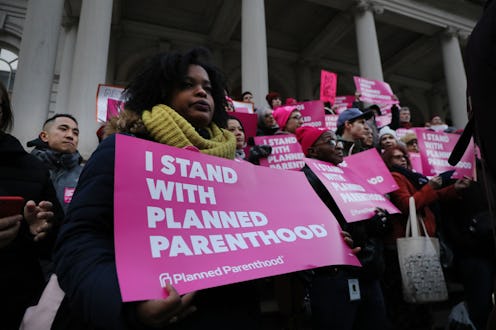News
This Court Ruling Just Cleared The Way For Ohio To Defund Planned Parenthood

Planned Parenthood was struck a major blow on Tuesday when the 6th Circuit Court of Appeals upheld an Ohio law that stripped state health care funding from the organization for performing what the law called "non-therapeutic abortions." According to 11 judges on the court, Ohio can defund Planned Parenthood because a state "may choose not to subsidize constitutionally protected activities."
The decision overturned a prior, unanimous ruling by a three-judge panel from the same appeals court. Planned Parenthood is now set to lose state money destined for health services like breast cancer and cervical screening, STI prevention, HIV/AIDS services, and sex education. That will amount to a loss of $1.5 million in annual funding from the state health department, CNN reports.
Dr. Leana Wen, Planned Parenthood's president and CEO, said in a statement Tuesday that she had visited the group's Ohio health centers and saw the many programs at work that "reduce maternal and infant mortality," among other things. "Today's court ruling will roll back the gains to public health — harming women's health, children's health, and the health of families across Ohio," Wen said in a statement obtained by Bustle.
Planned Parenthood of Greater Ohio served some 80,000 Ohio patients in 2017, and it taught educational programs to 45,000, according to Planned Parenthood's statement. It also administered 170,000 STI tests and 18,000 HIV tests.
The law, first passed in 2016 and signed by Gov. John Kasich, would have outsize impacts on the most vulnerable communities, public health experts have argued. Kersha Deibel, President and CEO of Planned Parenthood of the Southwest Ohio Region, said in a statement obtained by Bustle that the ruling would adversely affect communities of color and low-income Ohioans.
"This law would have an outsized impact on groups who have historically faced systemic barriers in accessing quality health care," Deibel said in the statement. "Blocking access to education programs for Ohio’s most underserved is unethical and downright dangerous for Ohio."
The court denied that the funding rule violated the Due Process Clause of the Constitution. "The affiliates are correct that the Ohio law imposes a condition on the continued receipt of state funds," Circuit Judge Jeffrey Sutton wrote in the ruling. "But that condition does not violate the Constitution because the affiliates do not have a due process right to perform abortions."
In a dissent, Circuit Judge Helene White, who wrote the previous ruling that upheld the funding, said this law amounted to an undue burden on a woman's right to choose. "The Constitution prohibits unduly burdening a woman’s abortion right, even in the form of laws that directly target only the gatekeeper to a woman’s abortion right - the provider," White wrote.
For the time being, nothing is changing for patients, Iris E. Harvey, President and CEO of Planned Parenthood of Greater Ohio, said in a statement obtained by Bustle. "To our patients, please know that we are here, our doors are open, and we will never stop fighting for you," Harvey said.
This ruling could be appealed to the Supreme Court, which now faces competing rulings in similar cases from different circuits. SCOTUS has avoided taking such cases but now may be left without a choice, The Washington Post reported. Tuesday's ruling affects Kentucky, Michigan, Ohio, and Tennessee.
The ruling was 11-6. Of the 11, four were appointed by President Trump.